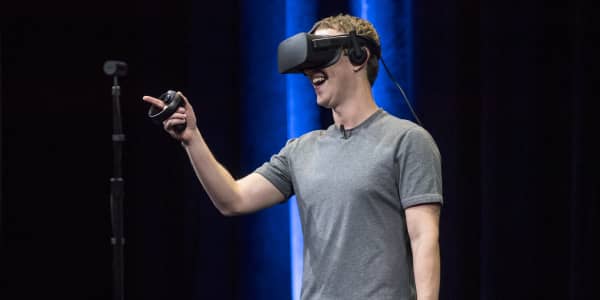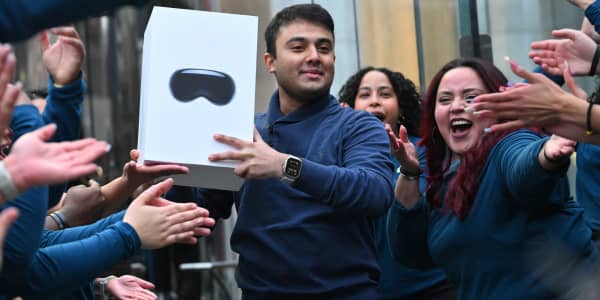Those ages 50 and older in the U.S. generate $7.6 trillion in economic activity, according to AARP, representing a huge financial force. That trend will grow as the number of older adults more than doubles by 2050, representing over 20% of the population.
As these boomers age, they want to do so actively, gracefully and independently. Technology is being viewed as the big disruptor that will allow them to achieve those goals. And that's presenting a huge opportunity for entrepreneurs developing these types of products.
"We're already seeing some really interesting ways technology is being used to help people as they age," said Ben Jonash, an author of The Future of Aging by the Deloitte Center for Health Solutions.
The broader demographic trends will fuel large growth of these types of companies in the coming years, says Jake Nice, a principal in Nationwide Ventures. "We're in the early innings of what's going to be a very large market," he said.
The so-called active aging industry in the U.S. — which includes safety and smart-living technologies, health and remote care, and wellness and fitness technologies — is expected to triple in the next three years, to nearly $30 billion, according to a report by the Consumer Technology Association. While the report finds that health and remote care lead the way, wellness and fitness technologies for seniors is expected to reach $900 million by 2022.
We're in the early innings of what's going to be a very large market.Jake Nicea principal in Nationwide Ventures, on technology for the active aging industry
Thousands of companies are chasing seniors in this market, says John Hopper, chief investment officer at Ziegler Link-Age Funds, which has invested $100 million in 25 companies, including Ally Align, a Medicare Advantage plan provider; Include Health, a designer and manufacturer of exercise and rehab equipment specifically for disabled and aging; and Caremerge, which coordinates care among senior-care providers and families. Higher percentages of older people want to be active longer and age at home. "We view technology as a big part of the puzzle of how we provide those services that the senior demographic is demanding," he says.
Mary Furlong, a leading consultant in the longevity marketplace, agrees. "There's a spirit about building not just a business but something for humanity," she said. At the June Silicon Valley Boomer Venture Summit that she spearheaded, entrepreneurs unveiled a variety of technology products targeted at allowing seniors to live healthier, active lives.
Here's a glimpse at some start-ups generating buzz in the industry.
Embodied Labs
When Carrie Shaw was 19, her mother, then 51, was diagnosed with Alzheimer's. She realized that if she could better understand her mother's disease and perspective, it could help improve the care she provided her.
So in August 2016 she launched Embodied Labs. Two years later Shaw rolled out an immersive program that uses virtual reality headsets. When worn, these headsets offer simulations in which caregivers to take on the persona of an aging person facing a variety of situations, including macular degeneration, Alzheimer's and Parkinson's disease.
Shaw says that having real insight into a loved one's condition will enable caregivers to develop empathy for older adults and in turn improve the way they deliver care. And with a projected shortfall of over 1 million direct-care workers by 2020, Shaw claims the Embodied Labs platform will help train and retain employees and improve difficult conversations with their patients.
Currently sold only to businesses, Embodied Labs has 100 subscribing organizations across the senior care, home health and home-care services for older adults, including The Green House Project, Hospice of Southern Maine, Comfort Keepers, the University of California Irvine School of Medicine and California State University Channel Islands School of Nursing.
Subscribers pay a one-time hardware setup fee starting at $2,500 and an annual subscription fee to the training platform based on the number of physical locations and number of employees or users.
The bottom line: The company has eight full-time employees and has raised $1.5 million of investment capital. It's also received $400,000 in nondilutive funding from groups including The Bill and Melinda Gates Foundation, AARP and the Department of Education. It's backed by The Ziegler Link-Age Fund as well.
Intuition Robotics
This company was founded in 2016 to help older adults avoid loneliness and social isolation, a common problem among the aging that can contribute to poor health. Intuition Robotics' debut product is a robot called ElliQ, which Dor Skuler, co-founder and CEO, calls "a sidekick for happier aging."
The proactive cognitive artificial intelligence product initiates conversation to help the senior stay in touch with family or loved ones, engage in healthy behaviors — including nudges to take medication — and stay connected with the outside world.
The ElliQ has 117 different ways just to say "good morning," Skuler says. It may, for example, check the weather, determine it's pleasant, then ask whether the senior wants to go for a walk. Loved ones can interact with ElliQ as well, sending photos through the app that the senior can see and respond to via a video screen.
The company plans to begin shipping the product in September. It has partnered with companies such as Comfort Keepers, the largest home care provider in the U.S., though individuals will be able to purchase the product. The pre-order cost is $1,500, with the monthly fee waived for the first 12 months; after that the monthly fee is $30.
The bottom line: Intuition Robotics has 74 full-time employees and has raised $22 million in funding, as well as a $500,000 grant from The Center for Aging and Brain Health Innovation for a clinical trial with the San Francisco Campus for Jewish Living and Baycrest Health Services in Toronto.
Ageless Innovation
While working for Hasbro, Ted Fischer developed a series of robotic pets that were created with the intention of fostering meaningful connections through play. It turned out that their largest customer base came from the older adult market because of the robotic pets' unique ability to engage, delight, provide companionship, calm, soothe and, most importantly, promote happiness — especially for those living independently or in care communities.
In 2015, realizing now that play has no age limit, the toy company officially launched its brand of companion pets under the name Joy For All.
The robotic cats and pups have sensors that allow them to interact with a human companion as they would with a live pet. The cat responds to touch, rolls over and utters 32 different types of purring sounds. The pup's heartbeat slows down if a hand is placed on its back.
In April 2018 the Joy for All management team left Hasbro to found Ageless Innovation. A month later they acquired the Joy for All brand, assets and business. Ageless Innovation now runs the brand independently and is completely focused on the older adult market, continuing to create new robotic companions.
"Our purpose is to reimagine how we age positively by unleashing the power of play," Fischer said. He said that studies have shown the pets to be an effective, nontraditional intervention in addressing loneliness among older adults.
The product is sold both to businesses, including senior living communities, as well as individuals; the cat costs $99, while the pup is $119. Ageless Innovation launched companies in the UK and Australia earlier this year. Since 2016, when Joy For All was under the Hasbro umbrella, 150,000 pets have been sold.
The bottom line: The company has five full-time employees. It's been funded by private investors to date. The company wouldn't disclose the amount raised.
More from Tech Drivers:
Your mobile phone is a magnet for stalkers and hackers. Time to protect yourself
Cape Cod's looking at technology to stop the shark attacks, but some say that could backfire
Sony's new smartphone hooks up to a PS4 controller for 'Fortnite' on the go
Neuro Rehab VR
Founded in 2017, Neuro Rehab VR provides a virtual reality experience for older patients undergoing physical therapy following a stroke, brain injury or spinal cord injury or who suffer from neurodegenerative diseases.
Just what is so special about this VR experience? Their technology is targeted: By employing machine learning, the company tailors each exercise to a patient's specific therapy needs and ability. The customized virtual therapy exercises record physiological and kinematic responses, quantifying the progress of the patient with scores and metrics over time.
By making the experience more like a game, it's intended to be more engaging. "When people put on the headset, they forget about their pain and what they can't do," so they stick with the training longer, said Veena Somareddy, the company's co-founder and chief technology officer. Patients are placed in a virtual world that covers a range of situations. For example, one scenario takes place at a grocery store, where they are tasked with picking items off the shelves.
Launched in March 2019, Neuro Rehab's VR exercises are being used in three outpatient physical therapy clinics, in Fort Worth, Texas; Willow Springs, Illinois; and Palmdale, California. Neuro Rehab VR is currently working on a home health mobile VR solution for patients to continue their VR therapy at home.
The bottom line: Neuro Rehab has five full-time employees. Funding to date has come from Somareddy's co-founder, Bruce Conti, a real estate developer who invested $700,000 in the company. Neuro Rehab, along with the University of Texas at Arlington Research Institute, also received a National Science Foundation grant for $224,893 in February to create a robot-assisted glove coupled with virtual reality to help rehabilitate stroke patients.
Toi Labs
Toi Labs founder and CEO Vik Kashyap aims to turn the toilet into a source of valuable health information. After realizing that what is flushed away can actually point to potential health problems, Kashyap created a toilet seat called TrueLoo. With the ability to fit on any toilet, TrueLoo has sensors that can determine who the user is. It then scans the toilet bowl to determine the size, color, consistency, frequency and shape of the excreta.
The information is provided to the senior living managers so they can monitor their residents' health. It's hardly appealing dinner table talk, but the information that can be revealed, such as dehydration, urinary tract infections and diseases like Clostridium difficile (also known as C. difficile and C. diff) and norovirus are big problems among seniors that can often lead to hospitalization. The idea is that catching these problems early allows them to be addressed, preventing hospitalizations and other, more serious health issues, including the spread of infectious diseases among senior living communities.
The TrueLoo is being used in Carlton Senior Living across four of their communities in northern California, with 70 installed to date. Kashyap says it will be rolled out to the general public following completion of a clinical study with the senior living community. Cost hasn't yet been determined; senior-living operators will likely pay a monthly fee.
VitalTech
VitalTech, a cloud-based platform that improves patient health and wellness through connected care, launched its newest product under its VitalCare brand in June 2018. Called VitalBand, the emergency voice call-out and fall-detection watch provides a more subtle way to monitor for falls, while tracking vital signs like heart and respiratory rate and oxygen saturation, as well as physical activity and sleep quality. It also provides medication reminders.
The concept was introduced to VitalTech in 2016 after board member Dan Flaherty noticed that residents of a senior-care nonprofit he financially supports were not wearing their pendants that monitor for falls.
"The pendants embarrassed them," said Ernie Ianace, one of the company's co-founders.
So the company set to work on a smart watch that would be easier for seniors to use, while monitoring for falls in an unobtrusive way. Just two years later, VitalBand was launched. It is water-resistant, sweat-proof and charges right on the wrist for 24/7 safety. If a fall is detected, an alert goes immediately to a certified call center ready to dispatch emergency services; if the user chooses not to have emergency response services, the fall alert is sent to up to five preconfigured family members and caregivers through text or email.
Through its VitalCare app, family members can view their loved one's streaming vitals, historical readings, manage fall alerts, edit profile information and view nutritional information.
There's a monthly subscription charge, ranging from $25 to $50 a month, including hardware, though costs may now be reimbursable through Medicare.
The bottom line: The company has 34 full-time employees. It is self-funded, with more than $13 million raised through friends and family. It recently closed an $8 million institutional round.
https://www.robotlab.com/store/zora-robot-solution-for-healthcare





